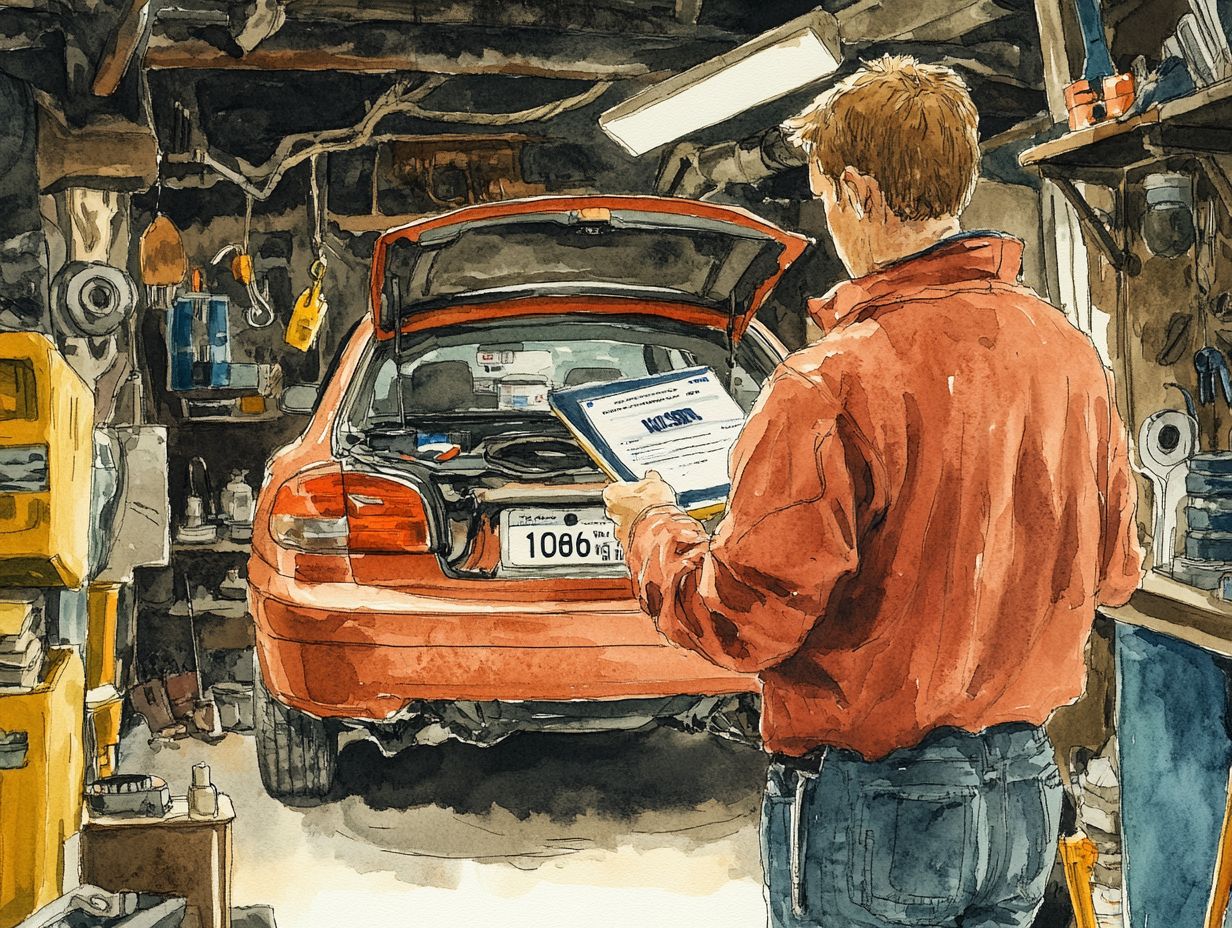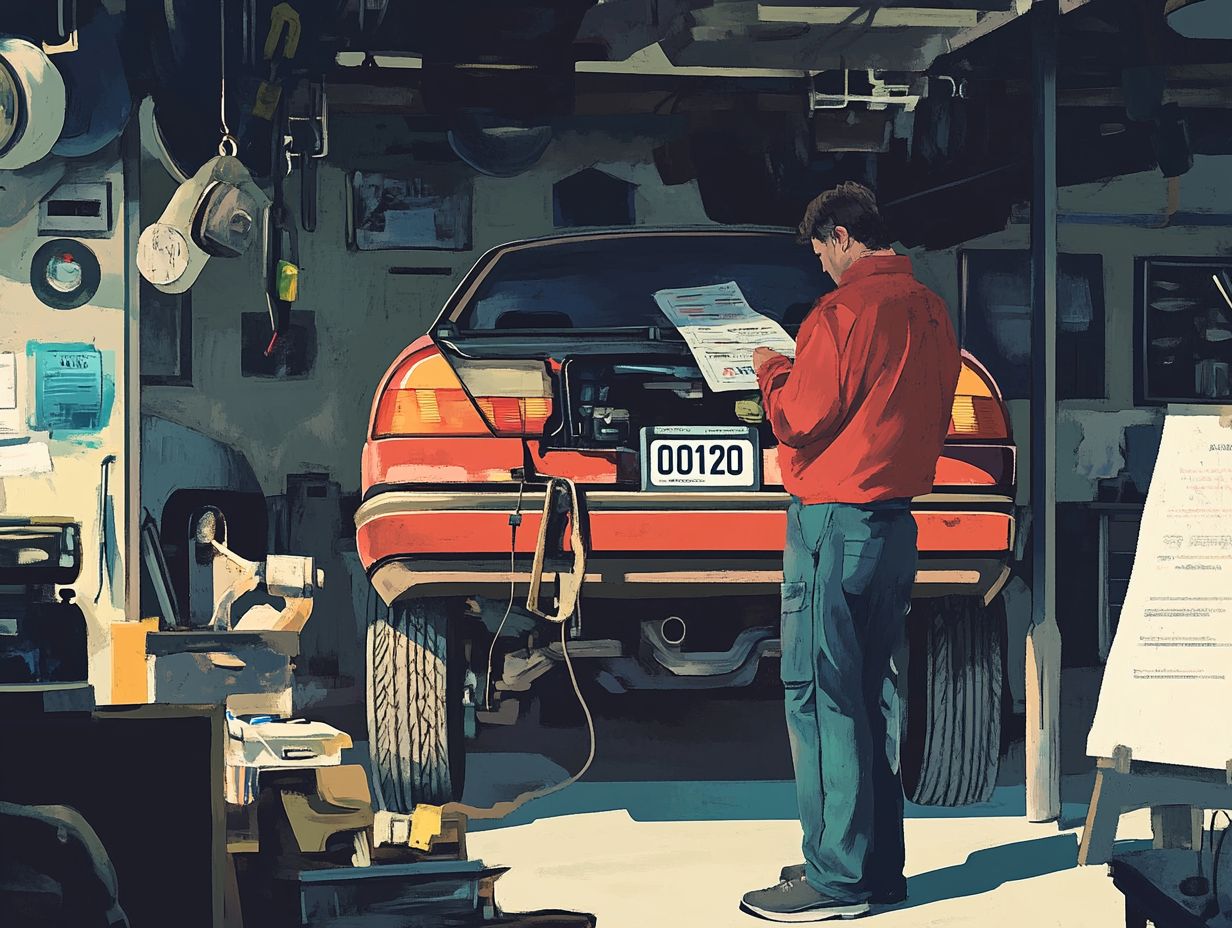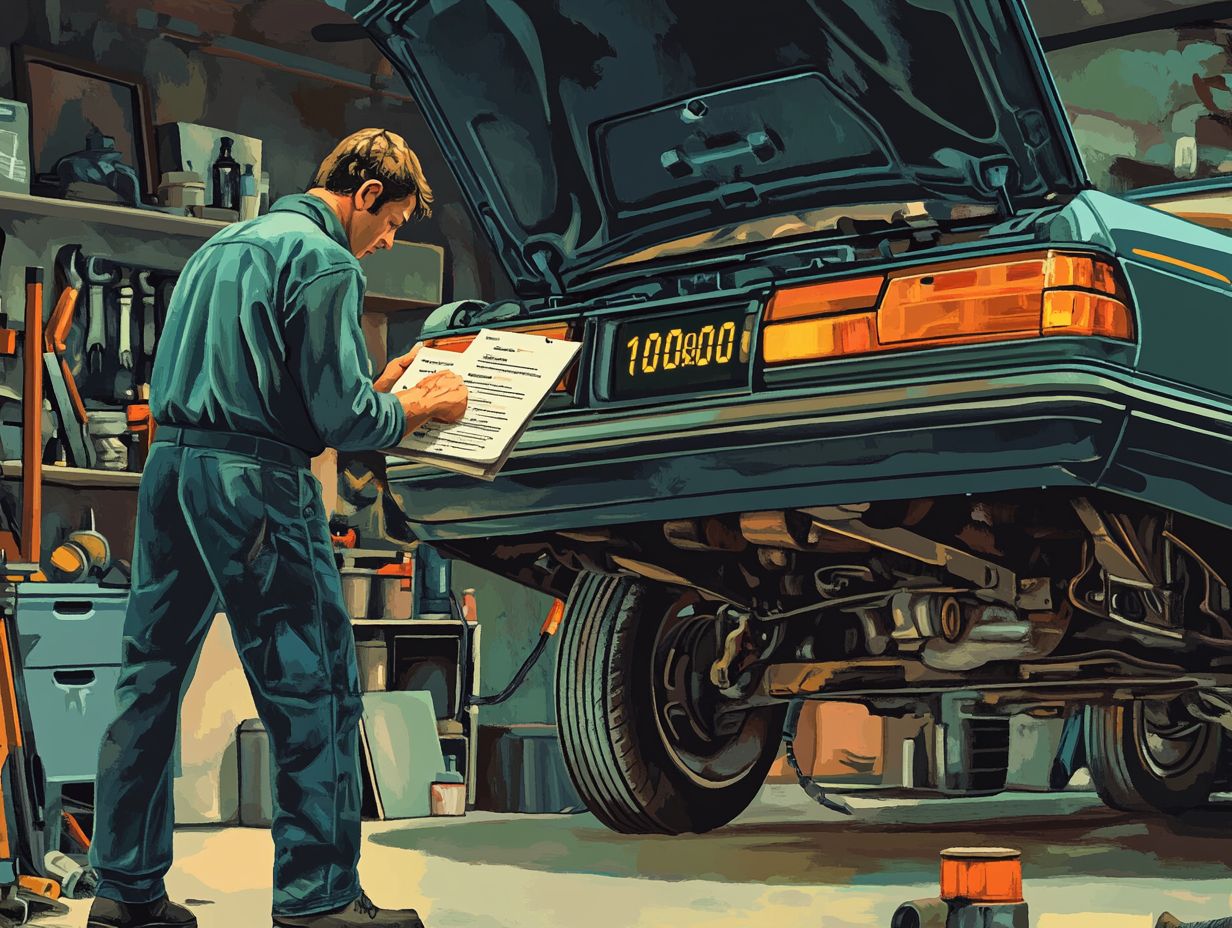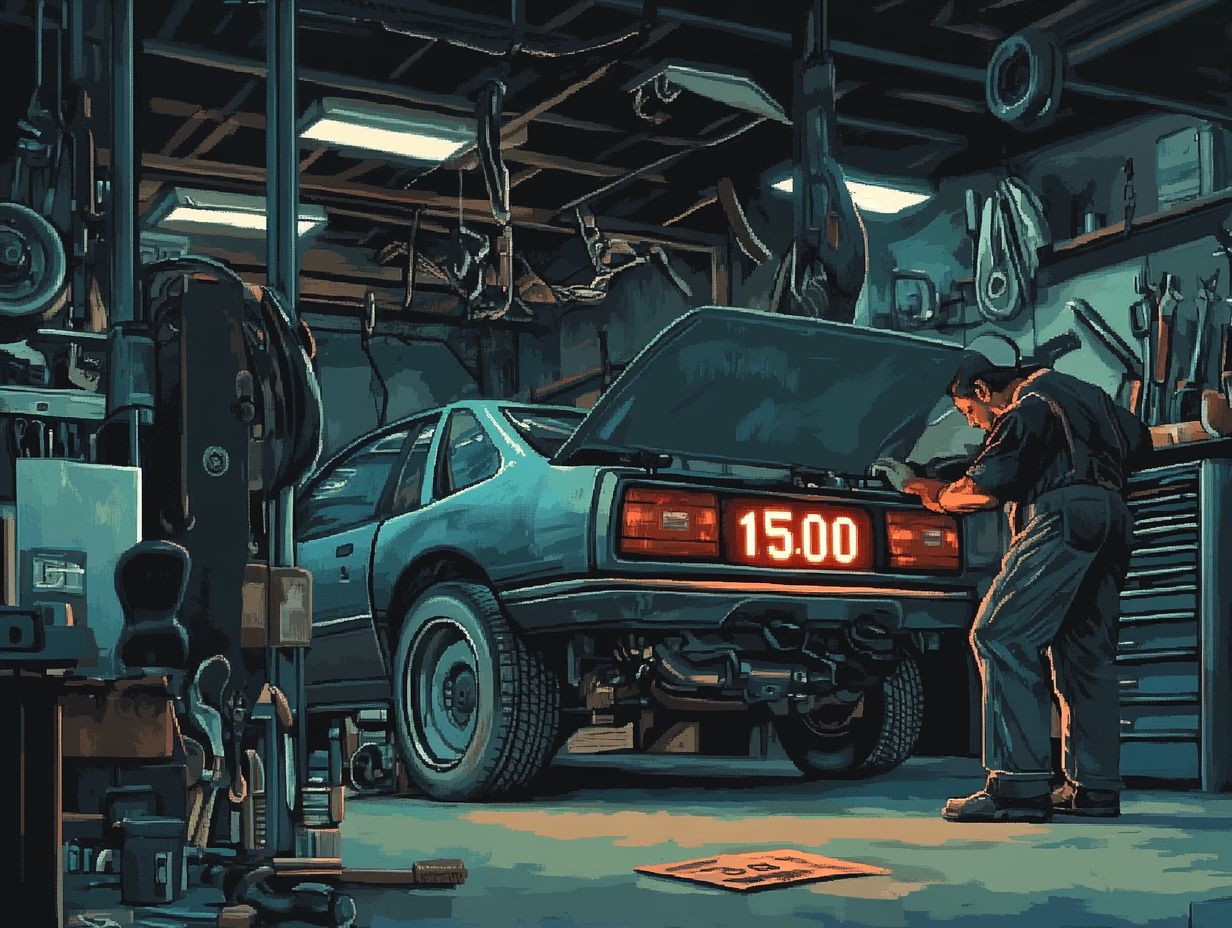Purchasing A Car With 150k Miles; Will It Be Worth The Risk?
When I think about buying a car, mileage really stands out as a key factor in figuring out its value and how long it’ll last.
I’ll help make the connection between the mileage and a cars worth, helping you understand what to keep in mind when buying a high-mileage vehicle.
With insights on vehicle history, maintenance, and the specific pros and cons of snagging a car with 150,000 miles, you’ll get the knowledge you need to make a confident decision.
Having a certified ASE mechanic inspect the vehicle before purchase is key to buying a used car with high mileage. We trust the team at American and Import Auto Repair of Johnson City, TN and you can make an appointment online anytime!
Understanding Mileage and Car Value

Understanding mileage and how it affects car value is super important when I’m shopping for a used car, especially if it has around 150k miles on it.
The mileage on a vehicle can really impact its depreciation and resale value, so it’s essential for me to get a handle on how these factors work together to determine the car’s worth.
A car’s journey is basically written in its mileage, and being able to assess this helps me make smarter financial decisions down the line.
How Mileage Affects Car Value
Mileage really plays a big role in figuring out how much a used car is worth, especially when it hits those big milestones like 150k miles. As cars get older, their mileage can raise some red flags about reliability and possible maintenance problems, which can seriously affect how much they depreciate and their resale value. It’s super important to understand these factors if I want to make a smart investment in a vehicle.
For example, checking a vehicle’s inspection history can shine a light on hidden mechanical issues that might not be obvious at first glance. This helps me get a better idea of the car’s overall condition. Consumer reports often point out that high mileage can mean higher repair costs, which can leave me feeling a bit uneasy about my purchase.
Factors to Consider When Buying a High-Mileage Car
When I’m thinking about buying a high-mileage car, there are a few key factors I really need to consider that could impact my long-term ownership experience and satisfaction. I always make it a point to check the vehicle history report and maintenance records.
These can reveal any potential red flags and give me a clearer picture of the car’s reliability and how well it fits my lifestyle. Having this information is super important for making a smart decision about such a long-term investment.
Vehicle History
A comprehensive vehicle history report is a must-have when I’m checking out a used car, especially one with high mileage. This report gives me key details about the car’s accident history, how many previous owners it’s had, and any title issues. All of this info really helps me assess the car’s overall condition and its resale potential. Knowing these details can save me from making some pretty costly mistakes down the line.
Besides those crucial points, I always make sure to look at safety ratings and any past mechanical problems that might affect the vehicle’s reliability. For instance, if the report reveals a history of frequent repairs, that’s definitely a red flag about the car’s health.
I also pay attention to the dealer’s reputation because it can shape how I perceive the quality and trustworthiness of the sale. Building brand loyalty often comes from a positive ownership experience, so I think it’s smart to consider the make and model, especially since they relate to market value. Doing this thorough examination not only helps ensure I’m making a sound investment but also gives me some peace of mind.
Maintenance and Repairs
Reviewing the maintenance history of a high-mileage car is something I always make sure to do. It’s a crucial step in ensuring reliability and long-term performance. When I see a well-documented maintenance history and service records, it gives me peace of mind knowing that the vehicle has been properly cared for, which can really lower the chances of future mechanical headaches. Plus, understanding the repairs that have been done helps me get a clearer picture of the total cost of ownership.
Having an organized maintenance schedule is a game changer. Not only does it boost the engine’s condition, but it can also significantly extend the vehicle’s lifespan. Regular inspections are a smart move to catch those small issues before they turn into expensive repairs, ensuring that parts are available when I need them.
This proactive approach doesn’t just keep repair costs down; it also lets me take advantage of any warranty options that might cover certain procedures. By sticking to a structured maintenance routine, I keep the engine in top shape, which gives me peace of mind and enhances performance on the road.
The Pros and Cons of Buying a Car with 150k Miles

Buying a car with 150k miles feels a bit like rolling the dice. There are definitely pros and cons to weigh before I dive in.
On one hand, those high-mileage cars can save me a chunk of change and usually come at a lower price than newer models. But on the flip side, I might face higher repair costs and some reliability concerns.
Figuring out these trade-offs helps me make a more informed choice about what could be a long-term investment. Finding the best used car online with over 150,000 miles is often made simpler viewing Consumer Reports survey findings.
Advantages of High-Mileage Cars
One of the best things about buying high-mileage cars is the chance to save a good chunk of money compared to those shiny new models. These cars usually have a lower price tag thanks to depreciation, which is a real win for anyone on a budget. Plus, insurance rates tend to be lower for older cars, making the overall cost even more appealing.
Not only does this mean I spend less upfront, but it also opens up different financing options that make owning the car feel a lot more manageable. Many high-mileage cars even come with warranty options, which gives me peace of mind despite their age and helps ease any worries about potential repairs.
With the demand for newer cars still sky-high, depreciation rates for older models really work in my favor. It lets me invest in a vehicle that suits my lifestyle without completely draining my wallet.
Potential Risks and Drawbacks
High-mileage cars definitely have their perks, but I know they come with risks that I need to keep in mind as a potential buyer. The more miles a car has, the more likely it is to have mechanical issues, which can lead to hefty repair bills that might just wipe out those initial savings. It’s really important to weigh these mileage concerns against my budget and long-term plans.
As cars age and accumulate wear and tear, their reliability tends to take a hit, and I might find myself visiting a Johnson City auto repair shop more often. This is especially true if the car doesn’t have a solid maintenance history; previous owners might not have kept up with the necessary upkeep.
I’ve learned that getting a thorough inspection is a must for any high-mileage car, ideally from a mechanic I trust. By being aware of potential pitfalls, like that pesky increase in repair frequency, I can make smarter decisions that fit my financial goals and help me dodge any unexpected expenses down the line.
Tips for Evaluating a High-Mileage Car
When I’m evaluating a high-mileage car, I know I need to approach it carefully to make sure I’m making a smart investment. I always conduct a thorough vehicle inspection and make sure to take the car for a test drive. That really helps me uncover important details about its condition.
Plus, I’ve learned that knowing the right questions to ask the seller is just as crucial in figuring out if the vehicle fits my lifestyle needs.
What to Look for During a Test Drive
During a test drive, I really focus on the performance metrics to make sure the car lives up to my expectations. I pay attention to how the vehicle handles, accelerates, and responds to braking because these factors totally impact my driving experience.
Checking out the safety ratings gives me some peace of mind about how well the car can protect me and my passengers.
As I navigate through different driving conditions, I keep an eye on how the car stays stable and comfortable on bumpy roads and sharp turns. Comfort is a big deal for me, and it often comes down to the quality of the seats and the layout of the cabin—it makes for a much more enjoyable journey.
And let’s not forget about fuel efficiency! A car that gets great miles per gallon can really save me some cash in the long run. Plus, I always make sure to check out the available accessories, like a cool infotainment system or driver-assistance features, that can really elevate my overall driving experience.
Questions to Ask the Seller

When I’m checking out a used car, asking the right questions can really tip the scales in my favor. I make sure to ask about the car’s condition, how long the seller has owned it, and what warranty options are on the table. These questions help me get a clearer picture of what I’m diving into, revealing the vehicle’s maintenance history and any potential hidden issues.
I can’t stress enough how important it is to ask about the car’s accident history. Any bumps and scrapes can seriously impact its long-term reliability and resale value. I also make it a point to request maintenance records, like oil changes and inspections, because those are key to ensuring the car lasts.
Understanding any modifications made to the vehicle is super helpful too; it gives me insight into how it’s been used and whether those changes fit with the brand’s reputation. Plus, talking about vehicle certification and trade-in value sets the stage for a fair negotiation, helping me make a well-informed decision.
Making an Informed Decision
When I’m buying a used car, I know I need to make an informed decision. I take the time to assess my needs and budget so I don’t end up with buyer’s remorse later.
By evaluating the total cost of ownership—like insurance rates and possible repair costs—I can figure out if the vehicle really fits my financial situation and lifestyle. This kind of thoughtful approach is key to making sure I’m satisfied in the long run.
Assessing Your Needs and Budget
Assessing my needs and budget is a crucial first step in making sure my car purchase fits my lifestyle and financial goals. I have to think about how the vehicle will fit into my daily routine and what financing options are available to me. This kind of assessment helps me avoid overspending and ensures I find a car that actually meets my requirements.
Evaluating my driving habits is key, too, since it influences important factors like insurance coverage and fuel efficiency. Understanding how long I plan to keep the car can really help me make better choices about ownership duration, which affects resale value and long-term expenses.
I also find it super beneficial to check out competitive pricing across different models. This can reveal opportunities to save money without skimping on quality. The more I align my vehicle choice with my personal and financial circumstances, the happier I’ll be with my purchase in the long run.
Weighing the Pros and Cons of Auto Financing
Weighing the pros and cons before buying a car really helps me figure out if a high-mileage vehicle is the right choice for me. Doing a thorough cost-benefit analysis shows me potential savings and risks, which is crucial for my long-term investment. This kind of reflection can lead to a lot more satisfaction with my ownership experience.
I like to jot down the advantages and disadvantages, like depreciation rates and how the vehicle stacks up in the resale market. This way, I can make more informed choices. Plus, I think about how often I might need repairs on a higher-mileage car since that can really impact my overall costs and convenience.
Taking this systematic approach helps me weigh all the key factors and spot any hidden costs that might not be obvious right away.
Frequently Asked Questions
Is purchasing a car with 150k miles worth the risk?
It depends on various factors such as the condition of the car, its maintenance history, and your budget. Generally, a car with high mileage may require more repairs and maintenance, but if it has been well-maintained, it can still be a good investment.
What should I consider before buying a car with 150k miles?
When considering this type of purchase, it is crucial to thoroughly inspect the car, review its maintenance records, and take a test drive. You should also have a budget for potential repairs and be aware of the car’s reliability and resale value.
Will a car with 150k miles last long?
It depends on the make and model of the car, as well as how it has been maintained. Some cars can last well over 200k miles with proper care, while others may begin to have major issues at 150k miles. It is best to research the specific car you are interested in and check its average lifespan.
Should I be concerned about the car’s warranty when purchasing with 150k miles?
Most car warranties do not cover high-mileage vehicles, so it is important to keep this in mind when considering a purchase. However, some dealerships or manufacturers may offer extended warranties for older vehicles, so it is worth inquiring about.
What are some potential risks of buying a car with 150k miles?
Some potential risks include a higher likelihood of mechanical issues, more frequent repairs, and lower resale value. Additionally, a car with 150k miles may be more difficult to secure financing.
Are there any benefits to purchasing a car with 150k miles?
Yes, there can be benefits to buying a car with 150k miles. It may be significantly cheaper than a newer car, and if well-maintained, it can still provide reliable transportation. It may also have lower insurance rates, and you may be able to negotiate a better price with the seller.
Should I have a mechanic look over the vehicle before I purchase it?
Yes! You should have a qualified mechanic check the vehicle from top to bottom to ensure it will last and there are no underlying issues. If a problem is found, for example if the car has an oil problem, you’ll need to know how much it will cost to repair and if it can be repaired at all.

